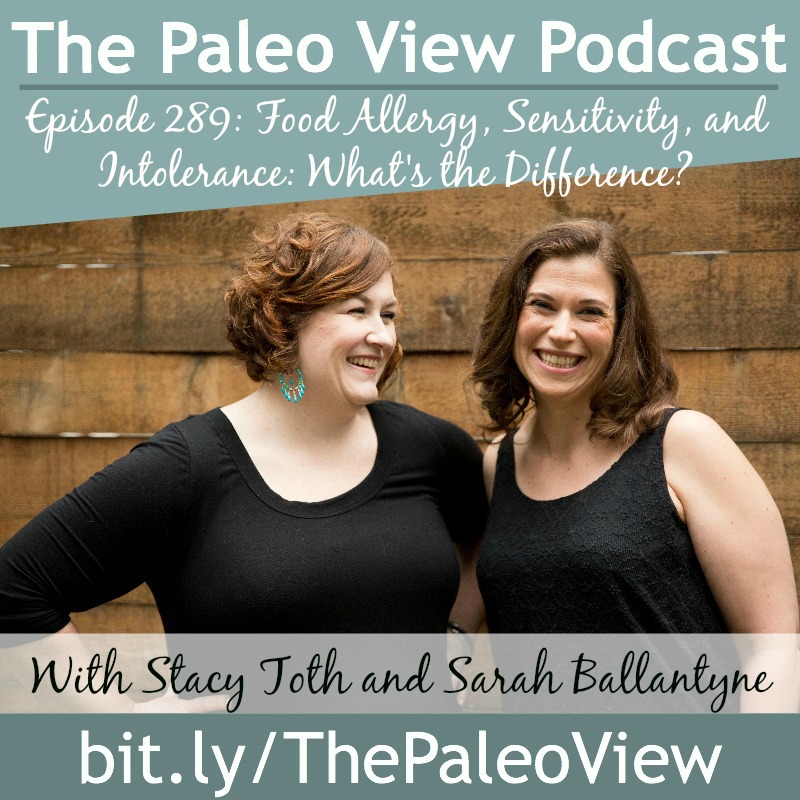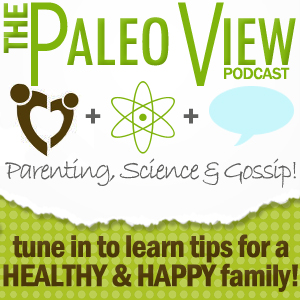Ep. 289: Food Allergy, Sensitivity, and Intolerance: What’s the Difference?
In this episode, Stacy and Sarah each had severe allergic reactions. Inspired by those experiences, they break down the differences between allergies, intolerances and sensitivities and why you might not get the correct information from allergy tests.
Click here to listen in iTunes
or download and listen by clicking the PodBean Player below
![]()
If you enjoy the show, please review it in iTunes!
The Paleo View (TPV), Episode 289: Food Allergy, Sensitivity, and Intolerance: What’s the Difference?
- Intro (0:00)
- News and Views (0:40)
- It’s been an interesting week for both Stacy and Sarah.
- Last week Stacy had an anaphylactic shock to gluten.
- This was the first time this happened to Stacy.
- Stacy’s mom has this, and Stacy was hoping she wouldn’t develop it.
- She assumed something was gluten-free and didn’t read the ingredients.
- Sarah was exposed to a Sulfa medication, which she is highly allergic to.
- She was nearly hospitalized and still recovering after a week.
- It was one of the biggest health crisis she has experienced, and very scary.
- She won’t be able to participate in the Cross-fit open because of it.
- This is a common experience – what life with autoimmune disease, food sensitivity, chronic illness is.
- Stacy’s reaction to things she is sensitive to is much less than it was years ago.
- She attributes this to improved gut health.
- She had no intestinal symptoms after being exposed to gluten recently.
- This was the most gluten she had been exposed to in over 8 years.
- Stacy was told in the allergist’s office that she did not have a gluten allergy.
- The receptionist at the office was excited that Stacy “could eat gluten!”
- Last week Stacy had an anaphylactic shock to gluten.
- It’s been an interesting week for both Stacy and Sarah.
- Science with Sarah: The difference between a food allergy, sensitivity, and intolerance. (13;28)
- Allergy vs. Intolerance
- Both reactions are mediated by antibodies being produced against an antigen in the food.
- The difference is in the type of antibodies that are produced.
- Allergies are mediated by IgE antibodies.
- Trigger the released of histamine from mast cells and basophils.
- This is a very fast working system, usually a fast reaction.
- Symptoms are caused by the release of histamine.
- Hives, rashes, swelling of tissues of the face, red skin, sneezing, coughing, red eyes, heart racing, GI symptoms, shortness of breath, etc.
- Anaphylaxis is a very severe, life threatening reaction characterized by hives, swelling, trouble breathing, and going into shock.
- Seasonal allergies are also caused by the released of histamine, but usually are less severe.
- Skin allergy testing is typically done in one of two ways.
- 1. By placing a drop of concentrated allergen on the skin and scratching it.
- 2. By injecting the allergen under the first couple layers of skin.
- Typically wait 20 minutes and rate the reaction to the allergen.
- This type of testing has been around for a long time.
- The false negative rate of skin allergy testing is around 10%.
- The false positive rate of skin allergy testing is between 50-70%.
- Blood tests for allergies measure IgE antibodies in the blood.
- They can test for over 150 things or more at the same time.
- The false negative rate of blood allergy testing is around 10-20%.
- The false positive rate of blood allergy testing is between 40-60%.
- Many allergists will back up these tests with an elimination type diet and monitor.
- Stacy has avoided this type of testing in the past because it wouldn’t add value to her.
- She already knows she has a problem with wheat.
- Allergies and sensitivities can change over time.
- Stacy asks how is it possible to have anaphylaxis but not have a positive skin prick test?
- There are situations where your body can release histamine bypassing IgE antibodies.
- However they usually don’t have this type of intense trigger.
- Food intolerances have symptoms that overlap food allergies.
- The symptoms of food intolerances are wide and varied.
- The symptoms are often delayed and slower compared to an allergy.
- Some research suggests if you have recently had an anaphylactic reaction, you have a higher false negative skin prick test rate.
- You have to have been exposed to the allergen relatively recently to have a measurable amount of antibodies (like 3-4 weeks) or the false negative rate is higher.
- There are situations where your body can release histamine bypassing IgE antibodies.
- Combing testing with an elimination diet and food journaling is the gold standard.
- This helps get around the high false rates of testing.
- Allergies are mediated by IgE antibodies.
- Stacy’s experience with modern medicine was concerning, especially because the doctor she saw was supposed to be a specialist in this area.
- The doctor didn’t fully listen or ask questions.
- He exclaimed after he performed the skin prick test, “oh, it happened today?”
- He was not thorough in thinking through what was happening in her body.
- The real reason she went in was to get a prescription for an Epi-Pen.
- Just because you go to a doctor and they tell you something, doesn’t mean it is the end all, be all.
- Stacy’s heart goes out to parents with kids who have anaphylactic reaction because it was so scary, she can’t imagine what that would be like for a small child who didn’t know what was happening.
- Food Sensitivity is any non-antibody mediated reaction to a food.
- FODMAP, histamine, and salicylate sensitivities are good examples.
- There is generally no testing method for these, which is frustrating.
- Stacy thanks everyone who reached out and sent positive thoughts to her this week.
- This type of immune activation is very energy-draining.
- Sarah and Stacy have both been sleeping and resting a lot this week.
- If you’ve enjoyed the show, please recommend it to someone who might enjoy it.
- We love when you share and when you leave reviews for us! Thanks for listening!
- Allergy vs. Intolerance
Support us by shopping through links on our sidebars- thanks!





